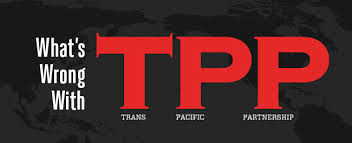The La Oroya villagers have a compelling personal reason to oppose the TPP. Their children are being damaged by a lead smelter whose owner is challenging Peru's environmental laws -- under an agreement that has provisions similar to the TPP.
Bloomberg recently reported that the Doe Run Lead Smelter's attack on Peruvian environmental law is part of a growing challenge by investors and corporations to government authority:
Most of La Oroya’s children suffer elevated lead levels, according to the Peruvian government. Parents say some have symptoms -- consistent with lead poisoning -- that include anemia, convulsions, stunted growth, mental retardation and the ills Barja said her son suffers.
The question of responsibility is at the center of a high-stakes clash between Peru and U.S. billionaire Ira Rennert, who owned Doe Run Peru for more than a decade through Renco Group Inc. Far from defensive, Renco is demanding $800 million from Peru because it ordered a costly pollution clean-up that the company says forced Doe Run Peru into bankruptcy in 2010. Renco has said it’s not responsible for the children’s ailments.
Its demand was made under an arcane, often secretive investor-state arbitration system that is growing rapidly in size and scope, roiling global trade and angering countries from Australia to South Africa over the perceived trampling of their sovereign rights.In some cases, reports Bloomberg,investors are demanding that national laws or court judgments be overturned.
There were 62 cases last year before international arbitrators at the World Bank or UN, bringing the total since 2000 to 480, Bloomberg reports. There were only an average of three a year since 1987.
Though the TPP talks are secret, leaked documents indicate the deal would further strengthen corporations and investors vs. sovereign nations. According to Public Citizen,
A major goal of U.S. multinational corporations for the TPP is to impose on more countries a set of extreme for-eign investor privileges and rights and their private enforcement through the notorious “investor-state” system. This system elevates individual corporations and investors to equal standing with each TPP signatory country's government- and above all of us citizens.
Under this regime, foreign investors can skirt domestic courts and laws, and sue governments directly before tribunals of three private sector lawyers operating under World Bank and UN rules to demand taxpayer compensation for any domestic law that investors believe will diminish their "expected future profits."
The Teamsters sent a representative to the Lima talks to support the Peruvian civil groups protesting the TPP. The Teamsters also hope to persuade the negotiators to open up the process to the public and slow it down so the public and the Congress can know what is being negotiated.
The Teamsters don't oppose trade, just unfair trade. As the International Institute for Sustainable Development notes,
The Teamsters don't oppose trade, just unfair trade. As the International Institute for Sustainable Development notes,
Where trade policy is in conflict with environment and development policy, it can delay or even undermine the achievement of sustainable development.Dr. Eduardo Bianco, a cardiologist from Uruguay, was also in Lima protesting the TPP. He believes any trade deal will let tobacco companies overrule national tobacco control policies. He should know. Phillip Morris is challenging Uruguay's strong tobacco regulations under the WTO. Reports MarketWire:
In March 2010, three subsidiaries of USA-based Philip Morris International (PMI) launched a damages claim against the Government of Uruguay under the Switzerland - Uruguay Agreement on the Promotion and Protection of Foreign Investments. The companies claimed that their rights under this agreement were impaired by Uruguay's requirements for health warnings that covered 80% of the cigarette package and by regulations to end the industry practice of colour-coding cigarette packages.Bianco is in Peru, fighting against the TPP. Speaking on a webinar about the trade deal, he said on Friday:
We think any kind of trade negotiation will increase the sales of a product that is dangerous to human beings. ...This treaty for sure will be used by the tobacco companies to undermine tobacco control policies.So...who do you want writing your tobacco laws, your government or Big Tobacco?

